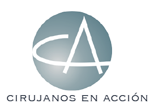Mission in Nigeria. October, 2016.
We were again at the airport, ready to begin our campaign. We were going to Eruwa, Nigeria, where some of us had been for the last time in 2012. After Dr. Yombo Awojobi’s sudden death in April 2015 there had been no missions there. Our group was made up by 4 general surgeons (Francesco Cannizzaro from South Italy, Sandra del Barrio, Gada Housari and myself, Teresa Butrón), 2 anaesthetists (Miguel L Vizcayno for his second time and Sonia Trabanco), and a surgical nurse (Celia Jiménez).
The previous days had been hectic as some of us did not get our visas till 48 hours before starting, after several visits to the embassy. Finally everything was settled. We spent those days collecting material, and Andrew Kingsnorth sent us Indian mosquito nets already sterilized for hernioplasty. In the airport we wraped our bags up with plastic sheet with their labels, we took a group photo and thus we felt we had started our campaign. This time our flight stopped at Casablanca where we met Francesco. We arrived in Lagos at 5:38 in the morning, and after passport control and collecting our bags we went out to look for Yombo’s son, an engineer living in Ibadan. He was there waiting for us with a van and security staff who accompanied us all the way to Eruva. We arrived after 3 hours on a road with much traffic and under rain all the time. We went to the hotel near the clinic where Tinu Awojobi, Yombo’s widow, was waiting for us. We went to our rooms, took a cold shower, and went to Tinu’s house to take breakfast: an omelet, toasts, butter, peanut butter, coffee and milk. Thus strengthened we went to the clinic and to the hernia pavilion we had inaugurated on 2012. There we organized all the material and we began to see patients. That was a Saturday and we operated upon five patients with inguinal and femoral hernias. We ended at sunset which comes early there as we were close to the equator, and after changing we came back to Tinu’s house for supper and commentaries on the day’s work. We were happy to have begun work on the very first day, and the whole group had worked happily together.
The same routine was repeated the following days. We arrived at Tinu’s house for breakfast at 7:15; we went there by car if it was raining, or walking, always accompanied by three security men. Tinu had done that to avoid any possible risks. We all, and particularly myself who had been there on other times, noticed no change with respect to previous times, and it looked a peaceful area. We went then to the clinic and examined patients left over from the previous days, then new patients, and we set up three tables, which was possible because some doctors from the clinic and from outside had come to help and thus to learn how to use meshes for healing hernias They all paid much attention and asked questions and even asked to be allowed to help with epidural anesthetics, hernioplasty, etc. Baba helped us as he controlled all the work inside and outside, and also two young male nurses who were very hard workers, Stephen and Manuel. We operated upon 13-15 patients a day on an average, some with 2 procedures, 8:30-9 till 6 pm. Nurse Celia, besides preparing the 3 surgical tables, set up the whole material from the stores discarding useless things and displaying the valid instruments with the help of Miguel, one of the anesthetists, so that on the last day everything was perfectly in order and classified so as to be used by the local staff in future campaigns. On finishing all the work we came back to Tinu’s house which was always full of people who greeted us, and we took our supper. Tinu switched on her wifi and so we all could be connected and communicate. It was dark by then and they took us to the hotel by car, and there we rested taking some beers and commenting on all the day’s activities. Thus went our days till Friday when we had to wind up and take farewell photos. Next morning after breakfast we collected the 2 diathermy generators and all the material we had with us, particularly the Roux or Farebeub separators and the dissection pincers. We packed everything to bring it back. Then we took many photos of us with the surgical staff and the doctors who had been with us, plus a group photo with all the clinical staff. We all were happy with our experience.
It has been a very fruitful campaign with 68 patients operated upon with 80 procedures, all adults, with 69 inguinal hernias of different sizes, 4 femoral hernias, 3 umbilical hernias, 1 Spigel hernia, 1 inguinal adenopathy which was complicated by a postoperational hematoma which was drained after 24 hours, 1 middle suprapubic eventration in which a minimal bladder opening required suture and vesical catheter for 10 days.
Doctors from the clinic and others who came from other hospitals helped us.
From the material we had brought with us all the gauzes and compresses, surgical linen (cloths and sheets) and gowns, all the electric scalpel terminals and part of the Indian and other mosquito nets were used. Some anaesthetic, antibiotic, analgesic, sutures, Indian and commercial meshes remained there.
We hope the Awojobi Clinic Eruwa campaigns continue year by year as an homage to Dr. Oluyombo Awojobi who worked so much with enthusiasm and gave hope to the poorest, teaching that team work makes it possible that health in a whole zone may improve with moderate expenses by the community. Thank you, Yombo.
Dra. Teresa Butrón


